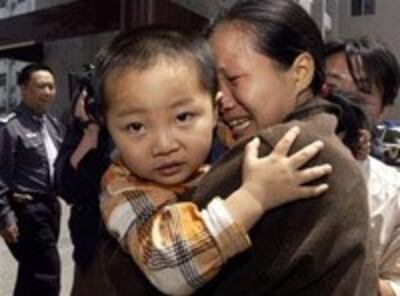
HONG KONG—Groups of parents throughout China have formed a last-ditch alliance in the hope of recovering their missing children, who are believed to have been kidnapped and sold in a booming adoption, bridal and sex trade in human beings.
While the phenomenon occurs right across China, recent interviews with migrant workers in the southern economic boomtown of Dongguan have revealed a virtual black hole from which dozens of children have never emerged, with some estimates saying that as many as 400 have “disappeared” in the area.
I think about my child day after day and wonder how he has been doing. I always burst into tears whenever I see other children laughing or crying.
“A reporter from China Central Television once came to do interviews,” an advocate for one couple who lost their son in Dongguan told RFA’s Mandarin service.
“When he was at the Dongguan public security bureau, we asked him if he knew how many children were missing in Dongguan. He said one official told him that more than 400 children are missing,” said the couple’s representative, identified by his surname Zheng.
Son taken from doorstep
Zheng represents the parents of Wang Dongping, who was 21 months old when he was kidnapped on March 17, 2006.
“My son was playing outside the door when a friend of mine came to visit me,” Wang Dongping’s father told RFA reporter Yan Ming.
“I walked inside with the friend and talked with him for a short while. When I went out, I found my son missing. Later the police came, but they didn’t say anything. The police should know who the suspects are,” he said.
“If they had started a thorough investigation in the neighborhood, they would have been able to find the suspects. Usually those people do not have regular jobs or have been idling around.”
Another woman based in Dongguan said she had had scant help from either the police or the All China Women’s Federation after her son, Qiu Youde, disappeared two years ago.
“I think about my child day after day and wonder how he has been doing. I always burst into tears whenever I see other children laughing or crying,” Ms. Qiu said.
Authorities no help
“I feel very bad and do not know what to do. I always ask the police if they have any clue, but they always say they haven’t got any. I have appealed to the higher authorities for help, but they always tell me to go back and wait patiently,” she said.
An officer who answered the phone at the Dongguan municipal public security bureau declined to comment.
“I can’t answer your question,” the officer said. “How can I answer your question over the phone?”
Wang Dongping’s father added that police were obstructive towards local journalists who attempted to cover the story.
“Yesterday a reporter from Guangzhou Daily came to Dalang [township] to do some interviews. The police didn’t allow us to talk to the reporter and treated the interviewees badly as if they were criminals,” he said.
Zheng said groups of parents whose children had been taken had formed loose alliances to carry out their own investigations, because they felt police had failed them.
Networks of parent sleuths
He said he knew of similar parental groups in the southern province of Hunan with contacts across the country; also in Xinyang city, in the central province of Henan, in Yunnan and Guizhou in the southwest, and possibly in southeastern Fujian.
Millions of migrants from the poorer, western regions of China flock to the booming eastern seaboard in search of work, but are frequently treated as second-class citizens, with little access to basic services, and sometimes working without pay for months on end.
One father, of Feng Yiqi, a child who went missing in Guizhou, has taken part in an under-cover investigation in an attempt to get closer to the kidnappers. He described his experience under cover:
“From July 28 to Aug. 1, another two children were kidnapped. They were about the same age as my son. According to the description of the witnesses, the kidnappers looked like those whom I had contact with during an investigation in 2004,” Feng said.
“But by law, suspects can only be detained for 12 hours. If they do not confess anything, they have to be released. I have had suspects arrested for several times, but all of them have been released. It is impossible to keep track of them,” he said.
Ancestral beliefs
Experts say trafficking in children in China is driven largely by a demand for sons in the domestic illegal adoption trade, based on deeply rooted traditional beliefs that only a male heir can carry on the family name and that a sonless marriage is a disgrace to one’s ancestors.
A total of 10,768 children were abducted and sold from 1980-99 primarily for the purposes of illegal adoption, according to a police survey in 2000.
However, the abduction, kidnapping and sale of young girls for forced marriage is also common.
Chinese police reported that nearly 360,000 women and children were sold into the bridal trade from 1995-April 2000 by traffickers, with many more trafficked overseas for sexual exploitation.
Original reporting in Mandarin by Yan Ming. RFA Mandarin service director: Jennifer Chou. Written and produced for the Web in English by Luisetta Mudie. Edited by Sarah Jackson-Han.
